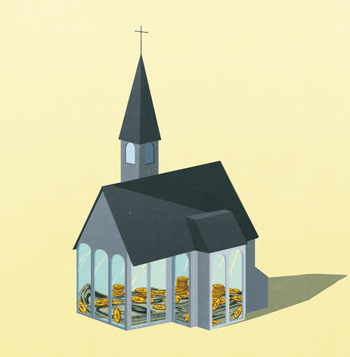
Illustration by Andrea Ucini
Several high-profile universities and nonprofit groups have recently grappled with the issue of “dirty money” – donations and named gifts associated with controversial sources. That may mean a donation from a person or company whose reputation has fallen into disrepute or controversy around the way the money was raised. The issue has hit the news in a variety of ways over the past several years, notably among several institutions – including high-profile universities – that accepted gifts from disgraced financier Jeffrey Epstein, a convicted sex offender. As well, several universities and theological schools have been confronted with their own legacies involving slavery, such as buildings named after people who owned slaves.
A recent article in the Stanford Social Innovation Review about “dirty money” by Lauren A. Taylor, Ph.D., a professor at New York University, examined the tradeoff institutions make when taking money. Taylor, who also holds an M.Div. degree from Harvard, argues that the issue of “dirty money” comes down to the “terms of exchange” between an institution and a donor, whether explicitly stated or not, and says harm can happen when an institution reciprocates by “bestowing influence or recognition upon donors” who are controversial.
In Trust’s Matt Hufman spoke with Rebekah Burch Basinger, Ed.D., an expert in theological education governance and fundraising, about how leaders in theological education should think about the idea of “dirty money.” She is the author of Growing Givers’ Hearts: Treating Fundraising as Ministry and project director of the In Trust Center’s Wise Stewards Initiative. This is an edited version of their conversation.
In her piece on “dirty money,” Dr. Taylor focuses on “terms of exchange,” particularly the big donations, like named gifts, and says that’s where harm happens. Would you agree with her assessment?
Yes, I would. Over the years, I’ve heard worried comments about named gifts from folks who assume that such gifts almost always come with strings. Those of us who approach fundraising as ministry find this a troubling assumption because we don’t think in the transactional terms that dominate the fundraising landscape. But I’d be naïve to suggest that faith-based organizations, including seminaries and theological schools, have escaped the problem of dirty money. We don’t have to look far for examples of quid pro quo in fundraising and/or of donors who’ve used their giving to advance personal agendas.
Money is a powerful influencer and especially so when an institution’s finances are tight. Fundraisers pray that our best efforts will result in a lead gift or significant grant in support of an exciting new initiative or building project. Then seemingly out of nowhere, a major gift appears on our doorstep. In that moment, it’s tempting to ignore strings or downplay donor expectations, and to question the source of the money behind the gift can feel downright uncivil or judgmental. The adage about rationalization having no upper limit applies doubly when there’s money on the table.
To question the source of the money behind the gift can feel flat out uncivil or judgmental.
We don’t always talk about strings attached because many of the gifts to a theological school don’t fit the patterns of big institutions and there’s not a lot of quid pro quo. But there is some exchange because a donor does associate with an institution, and there is some benefit to an association with a theological school.
We like to think it’s all pure motives when it comes to our schools, but we’re human beings, and we’re dealing with human beings. What begins as donor passion can go bad when a gift comes with expectations that the school will fall into line with the donor’s wishes. It’s not easy to tell a passionate person that what they want to fund doesn’t fit with the mission, vision, and/or values of the institution; that they’ve read the school wrong. We risk the donor walking away. For presidents, development staff, and boards, the prospect of a significant gift headed out the door is hard to accept.

Illustration by Andrea Ucini
In the Christian community, there can be a sense of redemption in the gift. You know the old saying that the devil has had the money long enough, and now it’s time to use it for good. Would you talk about the moral sense of that?
That’s one of those possible rationalizations. And I’m sympathetic to the idea that just because somebody may have earned their money in a way that isn’t quite in tune with the mission of the seminary or what we’re putting forward as who we are in the world and what our values are, that there may be other things to consider. People change over time, and if somebody shows up years down the road, and they’ve been very successful, and they found Jesus along the way, or their values have changed and they’re really aligning with us, it’s really hard to say, “I’m sorry, done is done and there’s no grace here.” It’s so complicated.
Now, some things I think are just really clear, like Jeffrey Epstein or the Sackler family (the family behind Purdue Pharma, the company that makes OxyContin). But there are states that are taking Sackler money now and doing drug treatment programs. Are there ways we can redeem some of that?
Then there are the estate gifts that many seminaries have come to depend on to balance their annual budgets. These are not completely out of the blue, coming as many do from faithful church people who’ve given smaller gifts throughout their lifetimes but who may not be known to the current administration. It could be that some of these folks earned their money in a way that falls under today’s definition of “dirty money,” Now they’re gone, and their money is with us. What are we to do?
Some schools allocate these types of gifts for helping repair damage done in years past. Is doing so a rationalization or a good faith effort to redeem the funds? One thing is certain: Making moral sense of issues like this is complicated, which is why it’s important that boards, development staff, even donors are engaged in crafting answers and developing policies to help guide when the next bequest or other unexpected and slightly soiled gift shows up.
The adage about rationalization having no upper limit applies doubly when there’s money on the table.
We’ve seen institutions across the country dealing with the legacy of slavery or the Me Too movement in which donors and people whose names are on buildings have been associated with some terrible things.
You’ve identified two big areas of national and institutional reckoning, but the big issues are not the only ones that can open wounds within a campus community or bring shame to an institution’s witness. In the region of the country in which I live, coal has been a huge part in the economy. Coal mining has also caused great harm to miners, communities, and the environment. I know of a college with strongly stated commitments to preserving the environment and championing renewable energy, but the beginning corpus of its now substantial endowment came from the owner of a significant mining operation. The owner and business are long gone, so returning an amount equal to the original gift isn’t possible. And even if it were, there’s the question of whether the interest accrued on the endowment carries the smell of dirty money. How can or should the institution make peace with the past? I don’t have an answer except to say again it’s complicated.
As Lauren Taylor notes in her article, it’s almost impossible to find a donor who is completely squeaky clean. It’s up to institutional leaders – including the board – to agree on what constitutes dirty money or bad motives in their settings. To be sure, there are principles that can apply across a broad swath of theological schools, but it’s difficult for me to sit here and say that school shouldn’t have taken that gift because it offends my sensibilities.
We are, in a sense, glass houses, because we proclaimed that we have a special purpose to advance God’s purposes in the world.

Illustration by Andrea Ucini
So, what should a board be thinking? I would assume there should be a conversation about this type of donation long before there’s a gift on the table.
Definitely. We don’t want the conversations to become personal or to put the development staff or the president in an awkward spot. Staff shouldn’t have to guess at what the board would want or what the board thinks. Well-crafted gift acceptance policies ward off case-by-case guesswork. Spending time thinking about scenarios and what-ifs is important and all the more so given the divisiveness that plagues our country, churches, and institutions. We should expect that donors will step forward with money and passions in hand, wanting to advance ideas they believe are the best for the school and its constituency.
Our policies may not be perfect. Nor is it likely that we can anticipate every eventuality. Creating policies that are specific enough to address the usual, yet flexible enough to provide direction for the unexpected, is a real art. A board may not get its policies right all the time, but with continued conversation, they’ll get closer to that mark. The work can begin in the advancement committee of the board, as committee members collect, review, and draft policies, talk with board members in other settings, read articles like Dr. Taylor’s, and then bring what they’ve prepared and learned back to the full board for their consideration. Conversations about “dirty money” and policies to protect the institution and its witness should have begun in boardrooms 20 years ago, but better late than never. Boards need to begin planning today for those eventual gifts that going to come down the road.
It sounds as if you’re talking about being really clear about what your values are and what your mission is so the money doesn’t necessarily move the mission away from where you want it to be.
Yes, and in fact, that’s one of the most important responsibilities of the board: to ensure that mission is maintained, to be always alert for mission drift because mission drift can happen so easily if a board is not attentive. There are lots of good things that we can do and many values that we can pursue or subscribe to. So, to be really clear about “this is who we are and where we stand” becomes really important. And then it’s important to be bold in proclaiming that. I think if we’re bold in proclaiming our values, we’re probably less likely to have a problematic donor show up. They’re going to say, “I’m going to try somebody else, these people actually seem to know what they are holding to.” But that is a primary role of the board, and then to make sure that the institution is living up to what it proclaims publicly.
It’s one thing to say, “This is what we do,” it’s another to live up to it. And our fundraising program, in many ways, is the most public face of the institution because it’s where we’re inviting so many people into the school. A lot of those are not the kind of donors that we’re talking about here, but they’re still getting the messages, they’re still watching to see who else is joining them in this support. And others are watching our fundraising programs as well, and particularly when we announce major gifts. It’s a very public aspect of the institution. This is, I think, a vulnerable place within our schools, and I don’t think we always are quite aware of how vulnerable we are there. Boards need to be very attentive to that.
It’s not easy to tell a passionate person that what they want to fund doesn’t fit with the mission, vision, and/or values of the institution; that they’ve read the school wrong. We risk the donor walking away.
How much background should we do on a donor? And, should we be looking at every named gift on campus that already exists?
For the most part, people who give to faith-based organizations do so with good hearts. They don’t give because they want their names on buildings or a seat on a seminary board. They give because they view the work as a channel through which they can be part of advancing God’s good plans for the world. Specific to theological schools, people give because they love the Church, they want their church to thrive, and they believe the need is great for faith-filled leaders for all kinds of organizations.
Now, that’s not to say we can’t make mistakes and we can’t be fooled by people.
We still need good policies. We want to be wise, thoughtful, and on our guard because we know that old adage about people who live in glass houses. We are, in a sense, glass houses, because when we proclaim that we have a special purpose to advance God’s purposes in the world, people are going to look for us to make mistakes, and they’re going to hold us to a higher level of accountability. And we should welcome that.




























